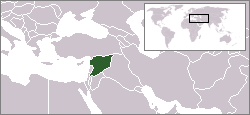LGBT rights in Syria
From Wikipedia, the free encyclopedia
| LGBT rights in Syria | |
|---|---|
 Syria |
|
| Same-sex sexual activity legal? | Illegal |
|
Penalty:
|
Up to 3 years |
| Gender identity/expression | - |
Lesbian, gay, bisexual, transgender (LGBT) persons in Syria face legal challenges not experienced by non-LGBT residents. Same-sex sexual activity is still considered illegal in Syria.
Contents |
[edit] Laws against homosexuality
Article 520 of the penal code of 1949, prohibits having homosexual relations, i.e. "carnal knowledge against the order of nature", and provides for at least three-years imprisonment.
[edit] Laws against transsexuals
In 2004 a Syrian woman named Hiba came forward as transsexual who had been given permission to have a sex change operation [1].
In 2007 a man married to a woman was legally declared to be a woman and ordered to end the marriage [2]
[edit] Living conditions
The Syrian authorities, namely the Secret Service, can use individuals' sexual orientation to blackmail, harass and eventually use members of the LGBT community. Law enforcement officers have zero tolerance to the LGBT community [3].
[edit] 2003 UN vote
In 2003 Syria, in the United Nations Commission on Human Rights, voted to postpone a United Nations draft resolution on human rights and sexual orientation. The vote was 24-17. The draft resolution would have the Commission express deep concern at the occurrence of violations of human rights in the world against persons on the grounds of their sexual orientation; stress that human rights and fundamental freedoms were the birthright of all human beings, and that the universal nature of these rights and freedoms was beyond question; and call upon all States to promote and protect the human rights of all persons regardless of their sexual orientation.
[edit] HIV/AIDS issues
The HIV/AIDS pandemic remains a taboo topic of discussion in Syria, as in much of the Middle East. The first reported cases of infection were in 1987, and the government has done little to prevent its spreading.
In 2005, the Health Ministry stated that only 369 person in Syria were infected with HIV-AIDS and that the government offers such persons, "up-to-date medicines to combat this disease freely," [4]. Yet, Non-governmental organizations estimate that there are truly at least five times that many and the United Nations chastised the government for its ineffective prevention methods [5].
The government has established voluntary clinics that can test for AIDS-HIV and distribute some educational phamplets, but comprehensive public education is still taboo [6].
AIDS-HIV education has become a part of secondary schooling as part of a campaign, working with the United Nations, to target youth and young adults [7].
[edit] See also
[edit] External links
|
||||||||||||||||||||||||||||||||